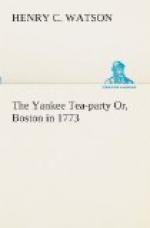The word went forth from hill
to vale,
Each patriot heart
leapt at the sound;
Proud Freedom’s banner
flapp’d the gale,
And Britain’s
chains fell to the ground.
Man stood erect in majesty,
The proud defender
of his rights:
For where is he would not
be free
From stern oppression’s
deadening blights!
Be free—be free
then, happy land!
Forever beam the
light that shone
Upon the firm and dauntless
band,
Who fought beside
our Washington!
Lo! where the forest’s
children rove
Midst woody hill
and rocky glen,
Wild as the dark retreats
they loved—
What now are towns
were deserts then.
The world has marked her onward
way,
Beneath the smile
of Liberty;
And Fame records the glorious
day
Which made the
western empire free.
Be free—be free
then, glorious land!
In union be thy
millions one;
Be strong in friendship’s
holy band,
Thy brightest
star—our Washington!
This song and the applause which succeeded wakened the sleeping fifer, Brown, who looked around him as if wondering where he was.
“Hallo, old boy,” said Kinnison, “you look frightened. What’s the matter with you?”
“I was dreaming,” replied Brown. “I thought I was at the battle of Lexington, and the roar of the British guns was in my ears. But I find it is only the roar of your voices. Liberty and Washington was our war-cry on many a field, and I thought I heard it again.”
“It was our peace cry,” said Hand.
Some of the young men, we regret to say, were not members of any of the temperance societies; and as they had partaken freely of the stimulating beverages which had been called for, they were getting very noisy and losing much of that bashfulness which had hitherto kept them silent. In this state of things, Mr. Hand was forced to entreat one of the veterans to amuse them with some interesting incidents of the Revolution.
“There was a British officer, whose career has often interested me,” said Hand, “and that was Colonel Tarleton. He was a daring, fiery soldier, according to the accounts of him; but a savage man.”
THE CRUELTY OF TARLETON.
“Tarleton was a regular blood-hound,” said Pitts, “A savage, though among civilized men. I always admired his fiery spirit and daring courage, but never could regard him as a civilized warrior. I’ll tell you of an instance in which Tarleton displayed his character in full. I had a Tory relative in North Carolina, who died not long ago. When Colonel Tarleton was encamped west of the Haw River, Cornwallis received information that Lee’s fiery Legion had recrossed the Dan, cut up several detachments of Tories, and was scouring the neighbouring country in search of parties of the enemy. The British general immediately sent information to Colonel Tarleton, to warn him to guard against surprise. My Tory relative was the messenger, and he told me about what he saw at Tarleton’s camp.




